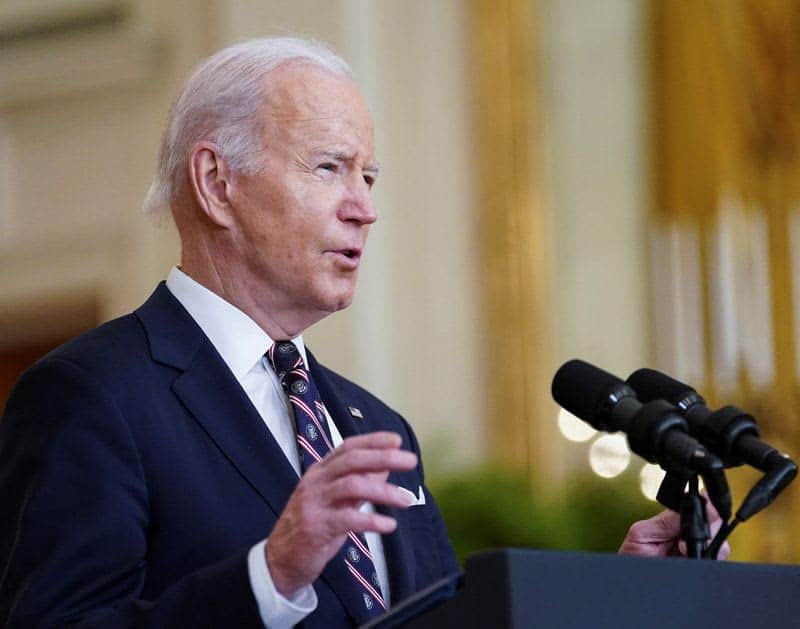Reuters

By David Morgan
WASHINGTON (Reuters) – Russia’s invasion of Ukraine brought no pause to partisan squabbling in the U.S. Congress on Thursday, as some Republicans blasted Democratic President Joe Biden’s handling of the crisis and called on him to “change course” in his response.
Some Republicans in the Senate and House of Representatives blamed Biden for failing to deter Russian President Vladimir Putin from sending forces into Ukraine and called on the U.S. president to take a stronger position on the largest conflict in Europe since World War Two.
“There’s no doubt that weakness leads to war,” Representative Brian Mast, a member of the House Foreign Affairs Committee, said in a Thursday morning tweet. “Putin once said the collapse of the Soviet empire was the ‘greatest geopolitical catastrophe’ of the past century for Russia. For America, President Biden may be the greatest geopolitical catastrophe of this century.”
The invasion of Ukraine followed months of Russian military buildup along the country’s borders, leading to frantic diplomacy and sanctions from the United States and NATO that failed to prevent the incursion. Biden plans an address to the nation at 12:30 p.m. EST (1730 GMT).
“Almost 12 hours since Vladimir Putin declared war on Ukraine and the only response we’ve gotten from Biden is a Zoom call. Where’s Biden? He’s the leader of the free world. It’s time to start acting like it,” Representative Carlos Gimenez wrote on Twitter.
Biden spoke with Ukrainian President Volodymyr Zelenskiy as the invasion began late on Wednesday, convened his National Security Council on Thursday, and met with his counterparts from the Group of Seven allies to map out more severe responses.
“The president must change course or our deterrent posture will continue to collapse, chaos will continue to spread and eventually no one will trust America’s promises or fear America’s power,” said Representative Mike Gallagher, a member of the House Armed Services Committee.
Former President Donald Trump — who even out of office remains the most powerful voice in the Republican Party — had threatened during his four years in office to leave NATO, calling the military alliance “obsolete.” He withdrew the United States from international agreements — including the Paris Climate Accord, which it has since rejoined — and pulled out of a pact in which Iran had curbed its uranium enrichment program, a possible pathway to nuclear arms, which is now being renegotiated.
Trump, who has expressed admiration for Putin, described the Russian leader’s actions leading up to invasion as “genius,” “smart” and “pretty savvy.”
ELECTIONS LOOMING
The response among congressional Republicans — blaming Biden, calling for stronger sanctions and warning against any use of U.S. troops in Ukraine — largely mirrored the sentiments of Republican voters, as lawmakers approach the Nov. 8 midterm elections that will determine the balance of power in Congress ahead of the 2024 presidential election.
Only 34% of Americans — including just 12% of Republicans — approved of the way Biden was handling the crisis in the run-up to the invasion, according to a Reuters/Ipsos poll conducted Tuesday and Wednesday.
Twenty-five percent of Republicans polled said Biden was primarily to blame for the conflict, with 46% saying Putin was primarily to blame. Nearly one in five was unsure who to blame.
Senator Mitt Romney, a member of the Senate Foreign Relations Committee and a moderate voice in his party, offered broader criticism that also blamed U.S. responses to Russia by former Presidents Barack Obama and Trump while evoking the Reagan era’s tough posture against the former Soviet Union.
“Putin’s impunity predictably follows our tepid response to his previous horrors in Georgia and Crimea, our naive efforts at a one-sided ‘reset,’ and the shortsightedness of ‘America First.’ The ’80s called’ and we didn’t answer,” Romney said in a statement.
Senator Dan Sullivan, a member of the Senate Armed Services Committee, warned that Putin’s action had changed the global landscape for the Americans and their Western allies.
“We must wake up to the fact that this new era of authoritarian aggression will likely be with us for decades. We need to face it with strategic resolve and confidence,” the Alaska Republican said.
(Reporting by David Morgan, additional reporting by Jason Lange; Editing by Scott Malone and Jonathan Oatis)



